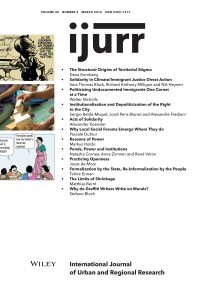In October of 2012, youth organizers from the immigrant justice and climate change resistance movements in the southeastern US metropolitan region of Atlanta, Georgia, coordinated a direct action tactic framed by a unified narrative justifying collaboration between immigrant and climate justice activists on equal terms. In a continuing collaborative relationship, these organizers embraced mutually strategic narratives rooted in local civil rights history, but rejected common ‘global climate justice’ narratives used to frame social and environmental collaborative organizing. We examine the departure from ‘global climate justice’ narratives, which was exemplified by coalition building in Georgia, to argue that scholarship articulating ‘global climate justice’ as a new context for integrating social and environmental movements must anticipate barriers to these solidarities, especially historical, regional and racialized dynamics of power among organizations engaged in these developing alliances. Based on an investigation of strategic alliances between anti-racist, immigrant justice organizers and climate change activists in the metropolitan areas of Atlanta and Athens, Georgia, we argue that climate justice narratives in both activism and scholarship would benefit from more attention to the particular political and cultural geographies in which diverse forms of climate justice organizing can take hold.
Details
Written by:
Sara Thomas Black , Richard Anthony Milligan and Nik Heynen
Digital Object Identifier (DOI)
10.1111/1468-2427.12341
About DOI
Read full article as HTML
See the references for this article

